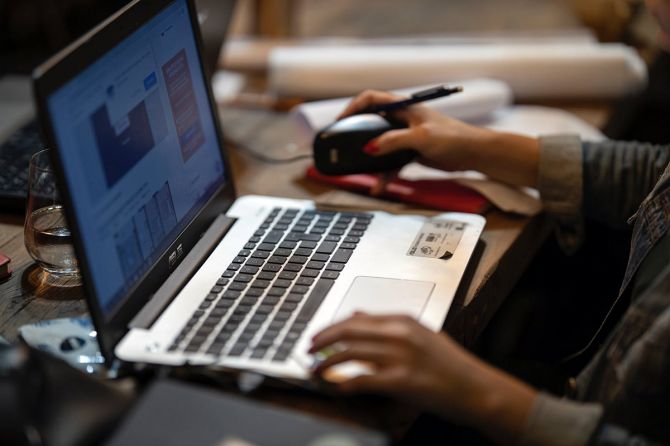'Further delay will do nothing other than the loss of a year and when there is loss of a year, think of next year you are having two first year batches.'
'Have the IIT system or similar institutions got the infrastructure to handle such a situation?'

In the wake of the pandemic, various political parties have demanded that national level entrance examinations like the NEET (National Eligibility cum Entrance Test) and the IIT-Joint Entrance Examinations, meant for admissions into medical and engineering institutions in the country, be deferred.
But the Union government has made it clear that both exams will be held as per schedule with due precautions in September.
On Thursday, August 27, Education Minister Ramesh Pokhriyal issued a statement saying that over 1.7 million out of the nearly 2.5 million candidates have already downloaded admit cards for the medical and engineering entrance exams.
IITs including IIT-Kharagpur, IIT-Ropar, IIT-Roorkee, IIT-Gandhinagar and IIT-Guwahati are in favour of the government's decision and making necessary arrangements for the benefit of students.
According to IIT-Kharagpur Director Virendra Kumar Tewari, conducting these exams is crucial since admissions to premier institutes like the IITs and medical colleges will not be possible otherwise.
"The aspirants need to put their faith in the organising bodies who have been working incessantly to offer a safe environment towards the logistical requirements for holding these examinations under the current situation," Professor Tewari states.
"Necessary facilities have been arranged for the students to ensure social distancing, hygiene protocols and even facilitation for probable asymptomatic cases," Professor Tewari adds.
"I understand the apprehensions, but would encourage the aspirants to take it as an opportunity to adapt to the new normal and strive for a brighter future," the IIT-Kharagpur director advises students.
"JEE has a global reputation for seeking excellence and is considered one of the toughest and prestigious examinations in the world. A quick alternative to JEE Mains and JEE Advanced will certainly not be as gratifying as competing for this examination by all fair means," explains Professor Tewari.
"Also, it could be misused as a precedent to dilute the entire admission process to the IIT system which may prove to be harmful for the quality of undergraduate education at the IITs," he adds.
"I urge the aspirants to take it up as a challenge and show their mettle and sincerity to the world," Professor Tewari states.
IIT-Guwahati also supports the decision to conduct JEE/NEET 2020.
"JEE exam is held multiple times in a year and students who don't appear this time can write after six months. Keeping in mind the effort put in by students who have prepared for JEE Mains and their future, it is critical that the exams are conducted as scheduled," Professor T G Sitharam, director, IIT-Guwahati tells Divya Nair/Rediff.com.
"The government and the examination centres will strive to maintain all safety standards of social distancing, wearing masks, etc, to ensure a safe environment during the exam. Delay in holding the exams will lead to serious repercussions for the students as well to the IITs and most of the year 2020 will be washed out," adds Professor Sitharam.
Professor Sarit Kumar Das, director, IIT-Ropar and member of the Joint Admission Board of IITs, urges students and parents to look at the situation from an academic standpoint.
"It's very unfortunate that political angles are coming in the matter of the future of the the nation's youth which should be completely avoided," Professor Das states.
"The JAB has been discussing with health experts and most importantly the conductors of the examination like the TCS company who arrange for this computer-based test. The JEE is now completely computerised and we have discussed different ideas -- even reducing it from two papers to one paper or increase of the number of centres, distance between students and so on," Professor Das reveals.
"So a lot of exercise has gone into it which people may not know, which the public at large may not be aware of. After all this discussion, the experts have taken a technical decision which is that it is possible to hold the JEE examination in September with appropriate security measures, health norms," Professor Das added.
"And this has been endorsed by the government. So the perception that the government has taken a decision and we are just going to execute it is absolutely improper."
Expressing his disappointment to all those who are against the exam, Professor Das asks, "To the people who are asking for a postponement... for how long? 2 months? 3 months? 5 months? Anybody has got an idea how the situation is going to be after 3 months, 5 months? So postponement is virtually leading to a position where we are looking at a zero academic year."
"Having a blank academic year is bad for everyone:. It is bad for the students, it's bad for the parents, it's bad for future jobs, it's bad for the academic institutions and everyone."
Professor Das points out that even if the JEE is held in September, classes won't begin before the middle of November at the earliest, which is equal to losing a semester.
"Further delay will do nothing other than the loss of a year and when there is loss of a year, think of next year you are having two first year batches. Have the IIT system or similar institutions got the infrastructure to handle such a situation? The answer is No," Professor Das points out.












 © 2025
© 2025